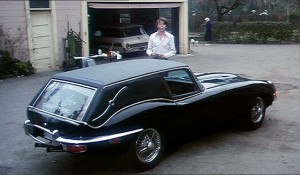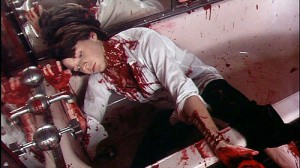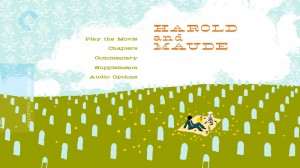100 Film Favorites – #77: Harold and Maude
(Hal Ashby, 1971)
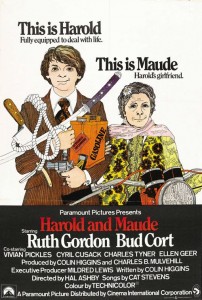 Hal Ashby (who also directed Being There) certainly has a talent for making offbeat films that leave an impression on the viewer. Harold and Maude tells the story of Harold, a “man” in his early 20s who is obsessed with death. Harold lives with his wealthy, controlling mother, and his only hobbies include pretending to kill himself and attending the funerals of strangers. He drives a hearse, and when his mother covertly exchanges the vehicle with a sporty Jaguar, Harold simply modifies the new car into a hearse as well.
Hal Ashby (who also directed Being There) certainly has a talent for making offbeat films that leave an impression on the viewer. Harold and Maude tells the story of Harold, a “man” in his early 20s who is obsessed with death. Harold lives with his wealthy, controlling mother, and his only hobbies include pretending to kill himself and attending the funerals of strangers. He drives a hearse, and when his mother covertly exchanges the vehicle with a sporty Jaguar, Harold simply modifies the new car into a hearse as well.
At a funeral, Harold meets Maude, a 79-year-old woman who also attends funerals recreationally. But whereas Harold sees funerals as a way to get closer to death, Maude sees them as a celebration of life. Maude’s vivaciousness despite her old age starkly contrasts the youthful Harold’s torpor. Over the course of the film, Maude’s optimistic attitude towards life begins to rub off on the formerly sullen Harold. She teaches him to appreciate life through spontaneity and creative expression, encouraging him to plant trees and play the banjo.
Harold and Maude grow closer, and Harold is intent on marrying Maude. However, at her 80th birthday party, Maude bids Harold “farewell.” Throughout the film, Maude has repeatedly voiced her opinion that 80 is the “proper age to die.” She reveals that, earlier that evening, she overdosed on sleeping pills, and will be dead within the hour. Though Harold rushes her to the hospital, she is beyond help and dies.
In the final shot of the film, Harold’s car hurtles over the edge of a cliff and plummets into a ravine. However, it turns out this was just another (and perhaps the last) of Harold’s fake-out suicides. Done with grief and ready to live a more worthwhile life, Harold pulls out his banjo and begins whistling as he walks away along the edge of the cliff.
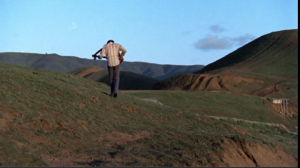 While initially unsuccessful both commercially and critically, “Harold and Maude” has gained something of a cult following and has become much more highly-regarded in recent years. The American Film Institute named it the 45th best comedy film to date in its “100 Years, 100 Laughs” countdown, and the 9th best romantic comedy in its “10 Top 10” list.
While initially unsuccessful both commercially and critically, “Harold and Maude” has gained something of a cult following and has become much more highly-regarded in recent years. The American Film Institute named it the 45th best comedy film to date in its “100 Years, 100 Laughs” countdown, and the 9th best romantic comedy in its “10 Top 10” list.
Some people dismiss Harold and Maude as just another instance of the “manic pixie dream-girl” trope. This is a largely pejorative label applied to films in which a vivacious female teaches an uptight or somber male to appreciate life. In response to this allegation, I have two things to say: If it’s a cliché, at least that cliché is played with here, with Maude’s persistent joie de vivre in the face of her septuagenarian status standing out sharply from other, predominantly physically youthful “pixie dreamgirls.”
 Secondly, these allegations simply highlight the prominence of cynicism in the world today, particularly in the online community. This is something of a growing personal peeve, but so often today I see people’s first response to…anything, really, to be cynicism and criticism. I know it probably sounds strange to be attacking “criticism” in what amounts to a list of miniature film reviews. I don’t want to dismiss the value of academic criticism, and I begrudge no professional film critic his paycheck. But I do strongly feel that there’s more joy to be had in creating something of your own than in tearing down the works of others.
Secondly, these allegations simply highlight the prominence of cynicism in the world today, particularly in the online community. This is something of a growing personal peeve, but so often today I see people’s first response to…anything, really, to be cynicism and criticism. I know it probably sounds strange to be attacking “criticism” in what amounts to a list of miniature film reviews. I don’t want to dismiss the value of academic criticism, and I begrudge no professional film critic his paycheck. But I do strongly feel that there’s more joy to be had in creating something of your own than in tearing down the works of others.
Generally I try to avoid making polarizing political or religious statements, particularly online, but let me emphatically state the following, which I cannot see anyone truly disagreeing with:
No work of art is “bad” solely because it encourages the abandonment of cynicism in favor of the appreciation of life. Life is all we have. If progress is possible, it is only by believing in that possibility that it can be achieved. Constantly second-guessing your own ideas and disparaging those of others will lead to stagnation, unhappiness, and an absence of progress. Form a worldview and use your views to build something. Create. Produce. Do. Don’t just read and watch. I know that sounds crazy coming from a guy who writes blurbs to be read, about films to be watched. But I mean it from the bottom of my heart (or, for you cynics out there, from that part of my brain whence the deepest-held convictions originate). Happiness lies in knowing that, through your labors, you have made something of value to both yourself and others. So resist the urge to be overly critical of your own works or those of others, and simply focus on making something you believe in. Live every moment as best you can, because whether you’re 21 or 79, you never get a do-over.
I’m no sage, but that’s what I think.
If anyone’s delicate sensibilities were irredeemably ruffled by that rant, I’ll understand if you choose not to keep reading this rinky-dink “Countdown.” But I had to say it, and hopefully it reaches a few people to whom it may do some good.
So yeah.
“Harold and Maude.”
Tidbit: The soundtrack, performed by singer Cat Stevens, is really quite good. One of the songs, “If You Want to Sing Out, Sing Out” was recently featured in a T-Mobile commercial:
—
Brian Terrill is the host of television show Count Gauntly’s Horrors from the Public Domain. You can keep up with Brian’s 100 Film Favorites countdown here.


